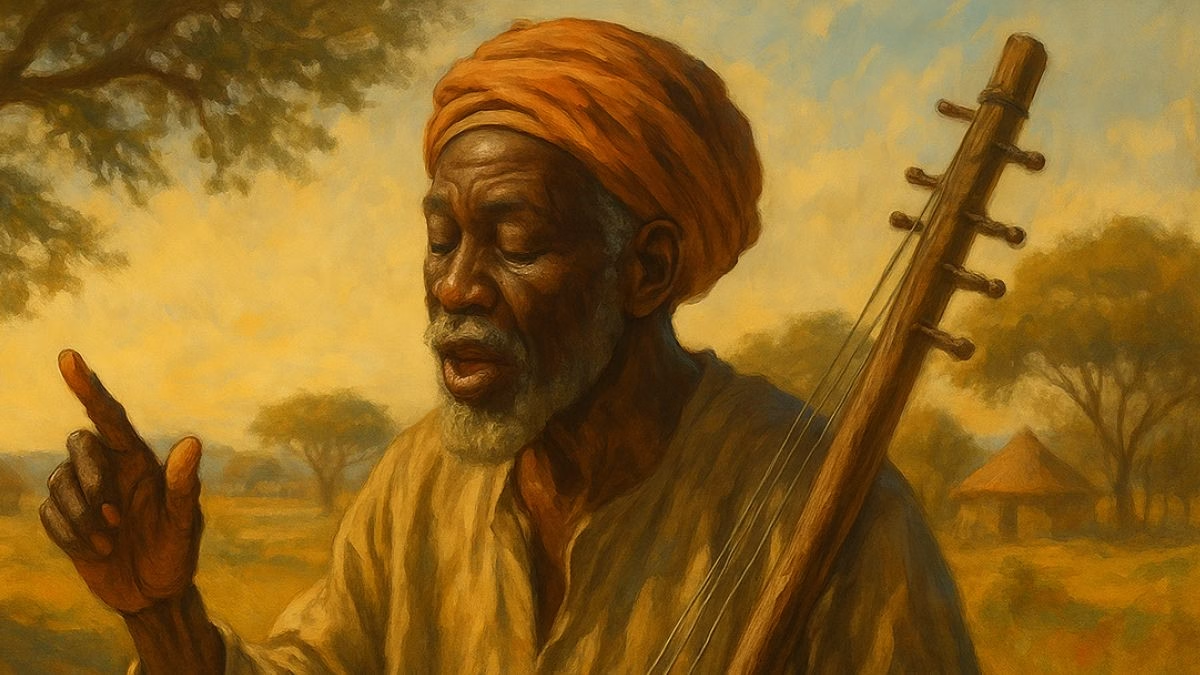Last time, we were in Latin America, where a generation of writers conjured up a world of magic and memory to tell the story of a continent haunted by its own history. They were fighting against a kind of historical amnesia, a silence imposed by power. But what happens when the problem isn’t just silence? What happens when your story has been told for you, by outsiders, and the version they’ve told is a caricature, a distortion, a lie? What happens when the lion, for centuries the silent victim in the hunter’s triumphant tale, finally learns how to write?
To answer that question, we must turn to the vast, complex, and astonishingly diverse continent of Africa. To even say “African literature” is a bit of a misnomer. This is a continent of over 50 countries, more than 2,000 languages, and a staggering array of cultures and histories. Its literary traditions are as diverse as its landscapes. But the story of modern African literature is, in many ways, the story of a powerful, continent-wide struggle: the struggle to reclaim the narrative. It’s a story of the collision between the ancient power of the spoken word and the revolutionary potential of the written one. It’s the story of taking the language of the colonizer and forcing it to tell the story of the colonized.
Before the Book, There Was the Voice
For most of Africa’s history, its great literature was not written in books. It was performed. It was sung. It was stored in the most powerful and sophisticated hard drive ever created: human memory. Oral literature was not a quaint or “primitive” precursor to writing; it was, and remains, a dynamic and powerful art form in its own right.Nowhere is this more evident than in the tradition of the Griot in West Africa. A Griot—or Jali in the Mandinka language—is so much more than a storyteller. They are a walking, singing, breathing library. For centuries, they have been the custodians of their people’s history, the keepers of the great genealogies, the advisors to kings, the musicians who sing the praises of heroes, and the social commentators who can use a proverb like a surgeon’s scalpel.
Their art is a total performance. It involves music, often played on the kora, a beautiful 21-stringed instrument that sounds like a celestial harp. It involves call-and-response with the audience, who are not passive consumers but active participants in the telling. A great oral epic, like the Epic of Sundiata—the heroic founding myth of the 13th-century Mali Empire—is not a fixed text. It is a living event, re-created and re-interpreted with every performance, yet with its core narrative passed down with astonishing accuracy through generations of Griot families. The Griot’s memory was the nation’s archive. Their voice was its history.
“Until the Lion Has His Own Historian…”
For centuries, this was the literary lifeblood of many African cultures. But in the late 19th century, the “Scramble for Africa” began. European powers carved up the continent with arbitrary lines on a map, imposing new languages, new religions, and a new, colonial order. By the mid-20th century, a generation of Africans was growing up educated in colonial schools, reading Shakespeare, Dickens, and Racine.
And in those books, they often saw a deeply disturbing reflection of themselves—or rather, a lack of reflection. The Africa they read about in European literature was often a dark, savage, and faceless place. The ultimate example of this is Joseph Conrad’s famous novella, Heart of Darkness. In that book, Africa is not a real place with real people; it’s a symbolic backdrop, the “other” against which a European man has his psychological breakdown. The African characters are not characters at all; they are grunting, shadowy figures, part of the landscape.
This experience, of seeing your home and your people used as a dehumanized prop in someone else’s story, created a burning need for a response. As the great Nigerian novelist Chinua Achebe would later put it, quoting an African proverb: “Until the lion has his own historian, the tale of the hunt will always glorify the hunter.”
In the 1950s, the lions began to write. And the loudest, clearest, and most important roar came from that very same Chinua Achebe.
When Things Fall Apart
In 1958, a young Igbo man from Nigeria named Chinua Achebe published a slim novel with a title taken from an Irish poem. It was called Things Fall Apart. Its publication was a literary earthquake. It was a novel that, in its quiet, dignified, and devastating way, changed the world. Achebe was consciously writing back to the colonial narrative, to the Conrads of the world. He wanted to show that his people had a history, a culture, and a complex society long before the white man ever arrived.
The first half of the novel does exactly that. It tells the story of Okonkwo, a fierce and respected warrior in a pre-colonial Igbo village. There are no European characters in sight. Instead, we are immersed in the intricate, rhythmic life of the community. We learn about its religious beliefs, its legal system, its social hierarchies, its art of conversation, and its rich use of proverbs (“among the Igbo, the art of conversation is regarded very highly, and proverbs are the palm-oil with which words are eaten”). We see a functioning, sophisticated, and deeply human society. We also see its flaws and internal tensions, embodied in the proud, inflexible, and deeply insecure Okonkwo.
Then, in the second half of the book, the first white Christian missionaries arrive. What follows is a masterful and tragic depiction of how a culture is systematically dismantled. It’s not a simple story of brutal conquest. The missionaries win converts by appealing to the outcasts of Igbo society. The colonial administrators establish a court that slowly undermines the traditional legal system. The culture doesn’t just break from the outside; it cracks along its existing fault lines. For Okonkwo, a man whose entire identity is tied to the old ways, this change is incomprehensible. Unable to adapt, and horrified by his people’s unwillingness to fight back, his story ends in tragedy. The final, chilling paragraph is written from the perspective of the British District Commissioner, who, after finding Okonkwo’s body, muses on the event. He thinks he might write a book about his experiences, and that Okonkwo’s story might be worth “a reasonable paragraph.” He’s already reducing this epic tragedy to a colonial footnote.
Achebe’s most radical choice was to write the novel in English, the language of the colonizer. But it was not the Queen’s English. He forged a new kind of English, one that was infused with the rhythms, cadence, and proverbs of his native Igbo. He was, in his words, “making the English language carry the weight of my African experience.” It was a revolutionary act of appropriation, of taking the master’s tool and using it to dismantle the master’s house. Things Fall Apart gave an entire generation of African writers the permission and the courage to tell their own stories, in their own voices.
The Weapon of Language
Achebe’s choice to use English sparked one of the most important debates in post-colonial literature: What is the proper language for the African writer? Is using the colonial language—English, French, Portuguese—a practical necessity to reach a wider audience, or is it a form of “mental colonization,” a tacit acceptance of the very cultural oppression you are trying to fight?
No writer has engaged with this question more profoundly than the Kenyan novelist and theorist, Ngũgĩ wa Thiong’o. Ngũgĩ began his career as one of Africa’s leading writers in English, with acclaimed novels like A Grain of Wheat. But in the late 1970s, while being held as a political prisoner by the Kenyan government, he had a radical change of heart.
The Choice to Write in Gikuyu
In his landmark book of essays, Decolonising the Mind, Ngũgĩ argued that the “cultural bomb” was the most dangerous weapon of colonialism. Its effect was to “annihilate a people’s belief in their names, in their languages, in their environment, in their heritage of struggle, in their unity, in their capacities and ultimately in themselves.” He came to believe that writing in a European language, no matter how skillfully, was to continue the work of that cultural bomb. Language, he argued, is not a neutral tool; it is a carrier of culture.
So, he made a decision that stunned the literary world. He renounced English as a language for his creative work. From that point on, he would write his novels and plays only in his mother tongue, Gikuyu. His goal was no longer to speak to an international audience, but to reconnect with his own people, the peasants and workers of Kenya, who had been cut off from a literature written in a language they did not understand. His first novel in this new phase, Devil on the Cross, was famously drafted on scraps of toilet paper in his prison cell.
This sparked a continent-wide debate. Achebe, on the other hand, argued that English, through the shared experience of colonialism, was now an African language, and could be a unifying force in nations like Nigeria with hundreds of competing local languages. There was no easy answer. But the passion and intelligence of the debate itself were a vital part of the process of African literature forging a new, post-colonial identity.
The Danger of a Single Story
We now leap forward to the 21st century. A new generation of African writers is on the global stage. They are the literary children and grandchildren of Achebe and Ngũgĩ. They are still grappling with the legacies of colonialism and the complexities of their national histories, but they are also writing about a new Africa, a world of globalization, diaspora, internet culture, and vibrant, cosmopolitan cities. And no writer better represents this new wave than Nigeria’s Chimamanda Ngozi Adichie.
Adichie, who sees herself as part of the tradition that Achebe created, has gained global recognition not just for her novels, but for her powerful articulation of a key idea, summed up in the title of her famous TED Talk: “The Danger of a Single Story.” The problem with stereotypes, she argues—like the old colonial stereotype of Africa as a dark continent—is not that they are untrue, but that they are incomplete. They take one story and make it the only story. Her life’s work as a writer has been to demolish single stories and replace them with a rich, complex, and dazzling array of human experiences.
Half of a Yellow Sun and Americanah
Adichie’s novels are a masterclass in this kind of complex storytelling. Her 2006 novel, Half of a Yellow Sun, is a powerful historical epic about the Biafran War, a brutal civil war that tore Nigeria apart in the late 1960s. Like Achebe, she is reclaiming a crucial and traumatic piece of her nation’s history. But she does so through the intertwined lives of five unforgettable characters: a university professor with revolutionary ideals, his upper-class Igbo wife, his British girlfriend, a loyal and observant houseboy, and a pragmatic, fiercely independent woman who becomes the professor’s sister-in-law. It is a novel that shows how the grand, sweeping forces of history are experienced in the most intimate spaces of human life—in the bedroom, in the kitchen, in the bonds of love and loyalty that are tested and broken by war.
Her 2013 novel, Americanah, is a brilliant story for our globalized age. It tells the story of Ifemelu, a sharp, funny, and observant young Nigerian woman who leaves for America to attend university. The novel is a profound and often hilarious exploration of identity, migration, and race. It examines what it means to be a “non-American black” in America, the subtle and not-so-subtle politics of black hair, and the challenges of a long-distance relationship. But crucially, it is also about the experience of returning home. When Ifemelu moves back to a booming, modern Lagos, she finds that she no longer fits in neatly there either. She has become a new kind of person, a transnational citizen of the 21st century.
Adichie represents a new generation of African writers who are confidently striding the world stage, telling stories that are unapologetically Nigerian and universally human. They refuse to be boxed in by the single stories of the past, whether those stories are about a “dark continent” or a continent defined only by its post-colonial struggles.
From the ancient, living voice of the Griot, carrying the memory of an empire, to Chinua Achebe’s revolutionary act of writing a new history, to Ngũgĩ’s defiant choice to decolonize his language, and to Chimamanda Ngozi Adichie’s celebration of our complex, multiple selves, the story of African literature is a powerful testament to the fact that literature is never just about telling stories. It is about power. It is about survival. It is about the fundamental human right to name your own world and to tell your own tale.
Next time, in the final episode of our journey, we will look at the world we live in now. We’ll see how the themes that have defined so much of the literature from Latin America and Africa—themes of migration, diaspora, and hybrid identities—have become the central story of our interconnected 21st-century world. Join me as we take a look at “The Global Bookshelf.”
List of Episodes in the Series
The Story of Literature EP1 | The First Scribes: Tales from the Fertile Crescent
The Story of Literature EP2 | Echoes of Olympus: The Greek and Roman Foundations
The Story of Literature EP3 | The Ocean of Stories: Epics and Wisdom of South Asia
The Story of Literature EP4 | The Brush and the Sword: Poetry and Philosophy in East Asia
The Story of Literature EP6 | Forging a Continent: From Beowulf to the Enlightenment
The Story of Literature EP7 | The Soul of the Steppe: The Great Russian Psychological Novel
The Story of Literature EP8 | Magic and Memory: The Boom of Latin American Literature
The Story of Literature EP9 | The Griot’s Legacy: Oral Traditions and Post-Colonial Voices of Africa
The Story of Literature EP10 | The Global Bookshelf: Migration, Identity, and the 21st-Century Story










0 Comments